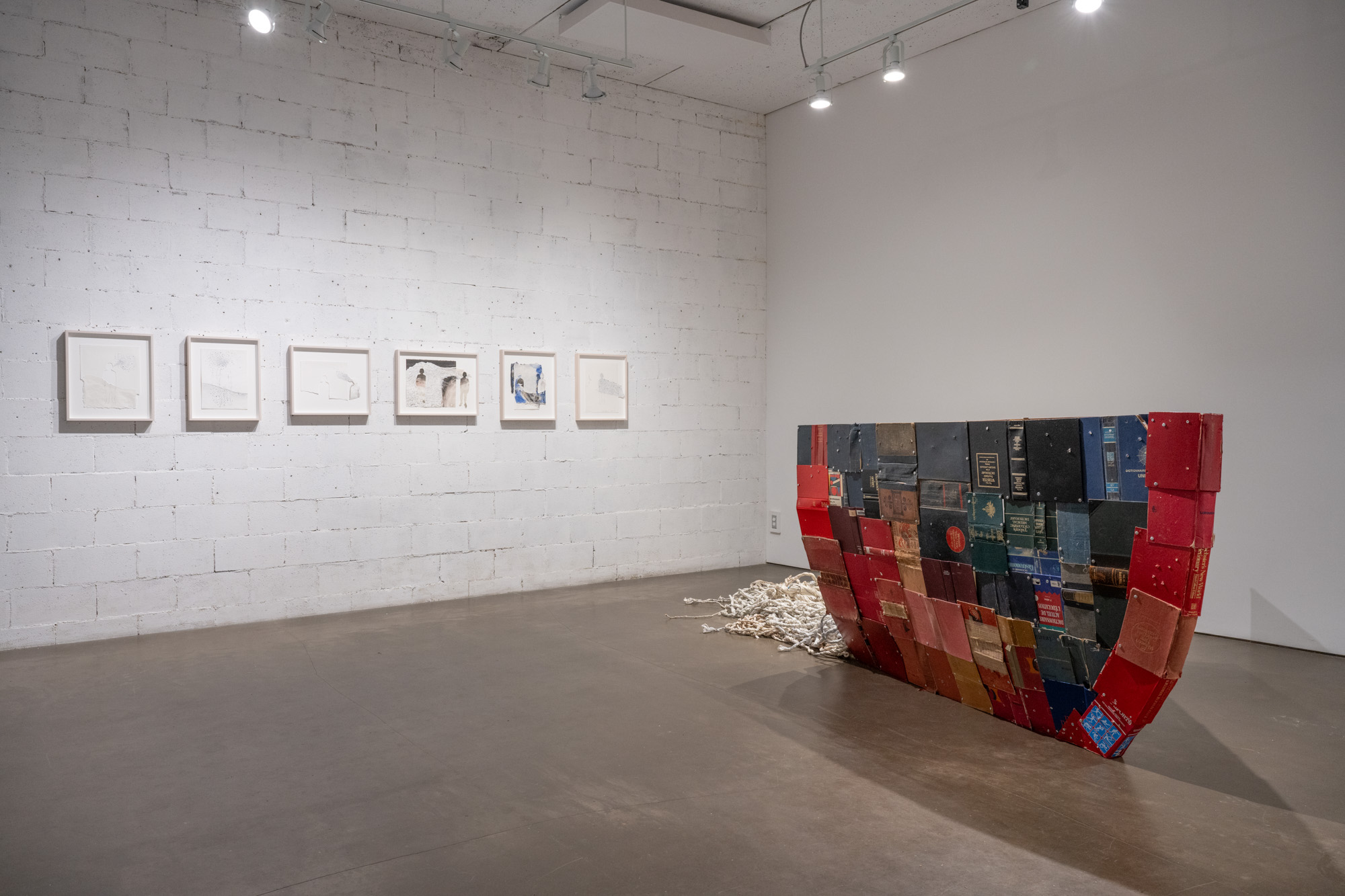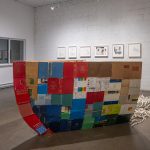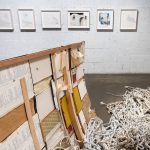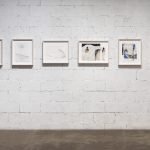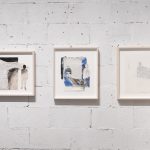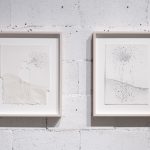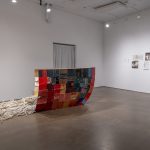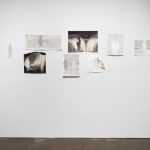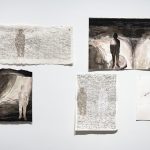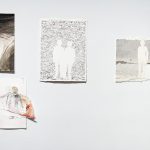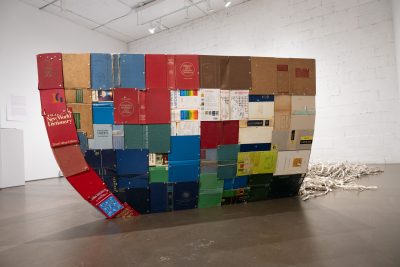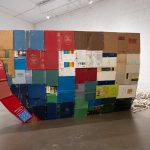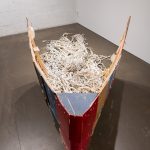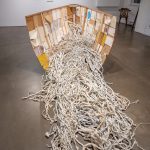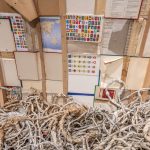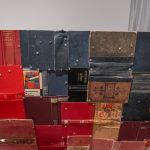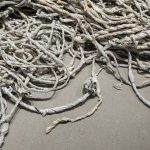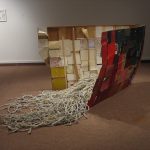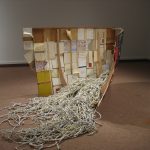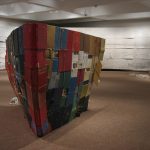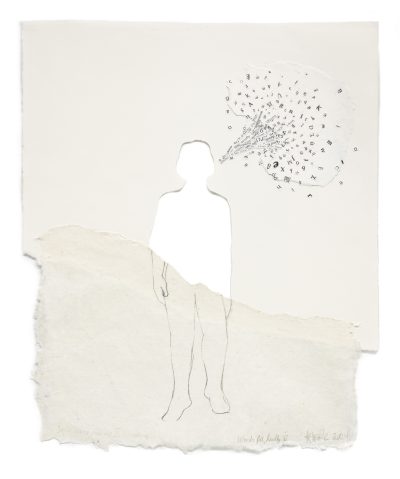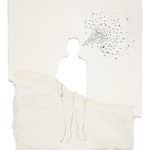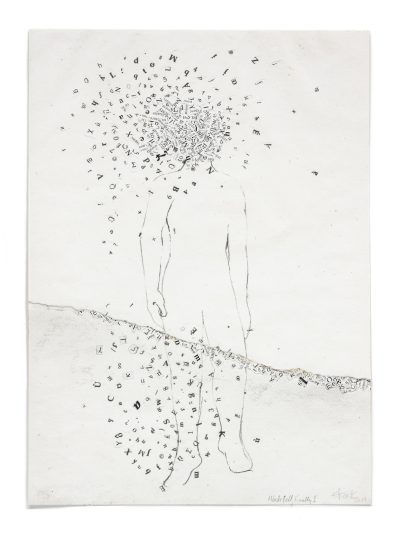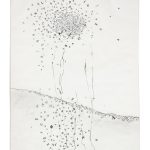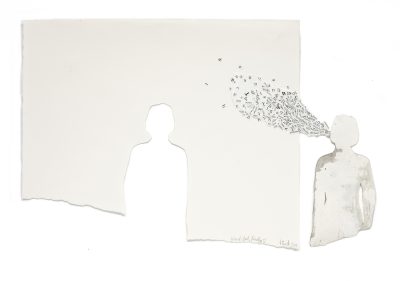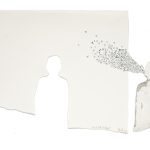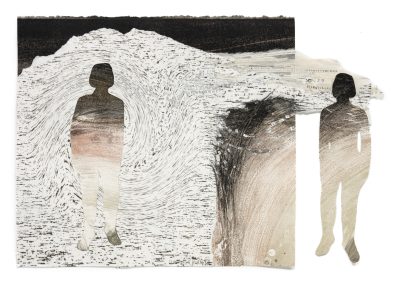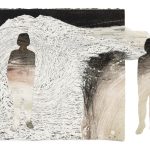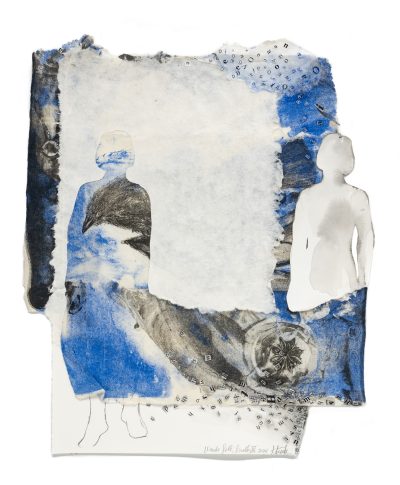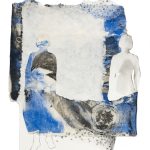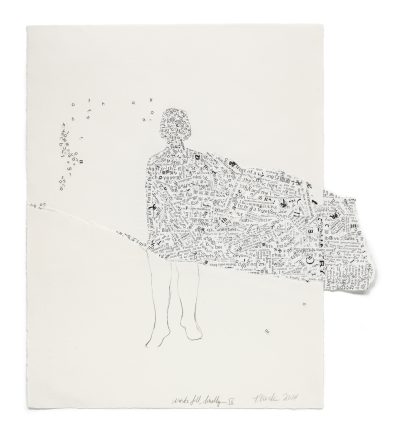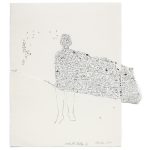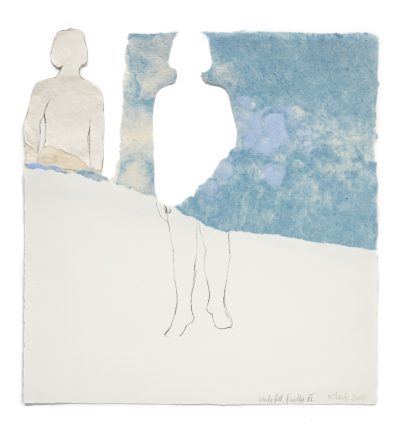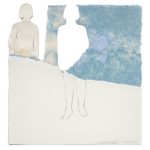Description
In Then Again, Karen Trask presented a new series of collages created from lithographs printed years ago. Complimentary to the series is a large boat constructed of dictionary covers and pages.
Statement
Then Again offers a glimpse of a reflexive conversation, with the landscape, the past and with words themselves. How much is it me that is changing and how much is it my environment that is changing? As a young artist, lithography and papermaking were my primary focus. The lithographs of these collages were resurrected from a pile set aside for recycling. Many already torn or crumpled offered a new perspective and vital starting point for the collages.
Paper and papermaking and their connection to words are an ongoing focus. I am fascinated by the power, poetry, rhythm and the constant presence of words and text in our environment. Paper in my work is a metaphor for silence – a foundation for sound, a support for text. The blank space of paper dominates the collages.
The same can be said of Interior Passage, a sculpture of dictionaries in the form of a boat – the prow of a wreck run aground. Come apart at the seams, its pages twist in long seaweed-like cords. The recycling bin is where I retrieved my first dictionary, beginning a long project of spinning text pages into threads. Originally, I thought this work was about language and the inability of a book to contain it. It is that, but it is also much more. It speaks of the end of an era, the end of the dictionary as a physical object.
A dictionary can never contain a language. It is only ever a skeleton to begin with, a shipwreck of words in a language that has already moved on. A book is not the language, like a recipe is not the meal, not the cooking, nor the eating.
Words are everywhere a river we swim in. This work is about transformation.
Karen Trask, 2024
—
L’exposition Then Again, de Karen Trask, présente une nouvelle série de collages créés à partir de lithographies imprimées il y a plusieurs années ainsi qu’une sculpture qui prend la forme d’un grand bateau construit à partir de couvertures et de pages de dictionnaires.
Then Again résulte d’un échange intime entre moi, le paysage, le passé et les mots eux-mêmes. Je me demande si c’est moi qui change ou si ce n’est pas mon environnement qui se transforme. Jeune artiste, j’ai développé une pratique en lithographie et fabriqué mon propre papier. J’ai voulu redonner vie à certaines lithographies après les avoir extirpées d’une pile destinée au recyclage. Ce regard neuf porté sur d’anciens travaux, déchirés et froissés, fut déterminant dans la création de cette nouvelle série de collages.
Je m’intéresse depuis longtemps au papier, à sa fabrication et à sa relation aux mots. Je suis fascinée par le pouvoir des mots et leur poésie, par le rythme et l’omniprésence des mots dans l’environnement. Ici, tout l’espace vierge du papier qui domine les collages m’apparaît comme la métaphore du silence – un espace pour accueillir le son, un support pour le texte.
Interior Passage est une sculpture en forme de bateau qui représente la proue d’une épave échouée. Je l’ai fabriquée à partir de dictionnaires dont les couvertures se défont et dont les pages s’enroulent en de longs filaments telles des algues. C’est après avoir récupéré mon premier dictionnaire dans un bac à recyclage que j’ai commencé un long travail de filage à partir de pages de texte. J’ai d’abord pensé que ce travail portait sur le langage et l’impuissance du livre à le contenir. Mais c’est beaucoup plus que cela. La sculpture évoque la fin d’une époque, la fin du dictionnaire en tant qu’objet physique.
Un dictionnaire ne peut contenir toute une langue. Il n’en est jamais qu’une ossature, une suite de mots échoués écrits dans une langue qui a déjà évolué.
Tout comme la recette n’est pas le plat, ni sa préparation, ni sa dégustation, un livre n’est pas la langue.
Les mots sont partout autour de nous, telle une rivière dans laquelle nous nageons. Au fond, ce travail porte sur la transformation.
Karen Trask & Don Goodes, 2024 (Traduction : Francine Lalonde)
—
There’s an island where time stands still. Where the life of flowers, trees and beasts is murky. The sea is silent. Everything is frozen, mired in a thick syrup-like substance. As soon as you land on the beach, your name, your history, and your past are lost. You dissolve into the flesh of the island.
The idea of such a place can be unnerving. Sometimes, I tell myself that you made a boat so you can go there – a boat made of old dictionaries that you’ve picked apart carefully, like dissecting a carcass. With ritual-like precision, you attached the covers to the hull, forcing the cardboard to bend, matching the arc of the boat.
To serve as moorings, you made ropes with the torn-out pages. They look like veins slipping through your fingers. From the studio, you cannot see what the ocean hides. But, you dream that by throwing these ropes into the water, all you hold dear will tangle like seaweed and with open arms, you can gather everything in.
You know this will not happen. You know that as soon as you take to the sea, the ropes will absorb water and slowly seep into the boat. Waterlogged, the skin of the hull will soften and dissolve leaving a frame, as bare as a whale’s skeleton. Initially, this upset you, but that has passed. Now your gestures are sweeping and gentle. You spin and weave, even if for nothing, even if no one ever sees the boat or its ropes or your dreams. There is a certain relief in admitting that everything eventually falls apart, and that in this dissolution, something new can be born. You capture a moment of transition; the point where what is tangible fades away, where memory and oblivion merge.
Céline Huyghebaert, 2024 (Translation from French: Karen Trask)
—
Il existe quelque part une île où le temps s’étire tellement qu’il semble arrêté. La vie des fleurs, des arbres, des bêtes est impalpable. La mer est silencieuse. Tout est figé, pris dans une matière épaisse et douce comme du sirop. Quand on accoste sur la plage, on perd son nom, son histoire, son passé. On se dissout dans la chair de l’île.
L’idée d’un tel endroit peut faire peur. Parfois je me dis que c’est pour t’y rendre que tu construis ton bateau. Un bateau fait de vieux dictionnaires que tu désosses méticuleusement comme on dépèce une carcasse. Tu fixes les couvertures sur la coque avec une précision presque rituelle en forçant le carton à se courber pour qu’il épouse l’arc des couples en bois.
Avec les pages, tu files des cordes qui te serviront d’amarrage. On dirait des veines que tu fais glisser sous tes doigts. De l’atelier, tu ne vois rien de ce que l’océan cache. Mais tu rêves qu’en y plongeant ses cordages, toutes les choses auxquelles tu tiens s’y emmêlent comme des algues. Alors tu n’auras plus qu’à tirer et ouvrir grand les bras pour les ramasser.
Tu sais que ça n’arrivera pas. Tu le sais. Au moment où tu prendras la mer, l’eau remontera le long des cordes pour s’infiltrer dans le bateau. La peau détrempée de la coque s’amollira jusqu’à se dissoudre, laissant l’armature nue comme le squelette d’une baleine. Cette idée t’a longtemps mise en colère. Mais la colère est passée. Maintenant, tes gestes se font amples, légers. Tu tisses, même si c’est pour rien, même si c’est pour que personne ne voie jamais ni le bateau, ni les cordes, ni tes rêves. Il y a un certain soulagement à admettre que tout finit par se désagréger. Et que, dans cette dissolution, quelque chose de nouveau peut naître. Tu captures ce moment de transition, ce point où le tangible s’efface, où l’oubli et la mémoire se confondent.
Céline Huyghebaert, 2024
